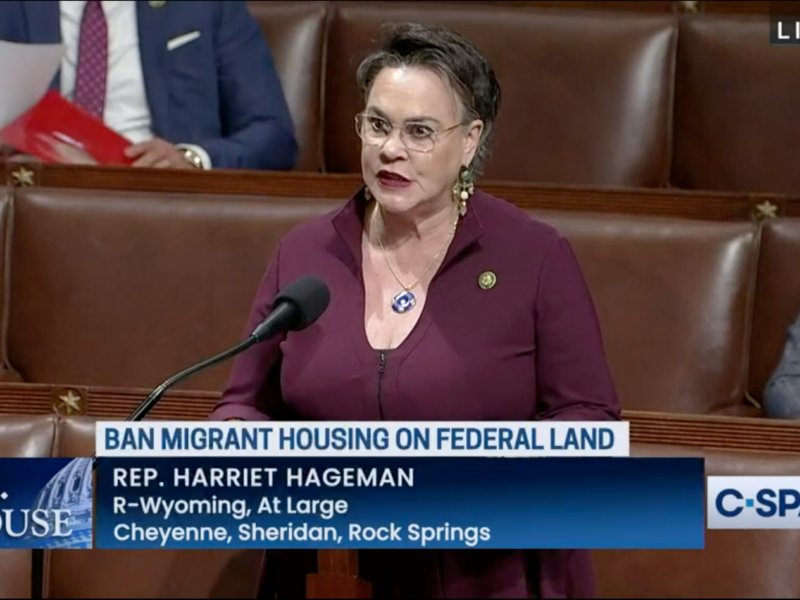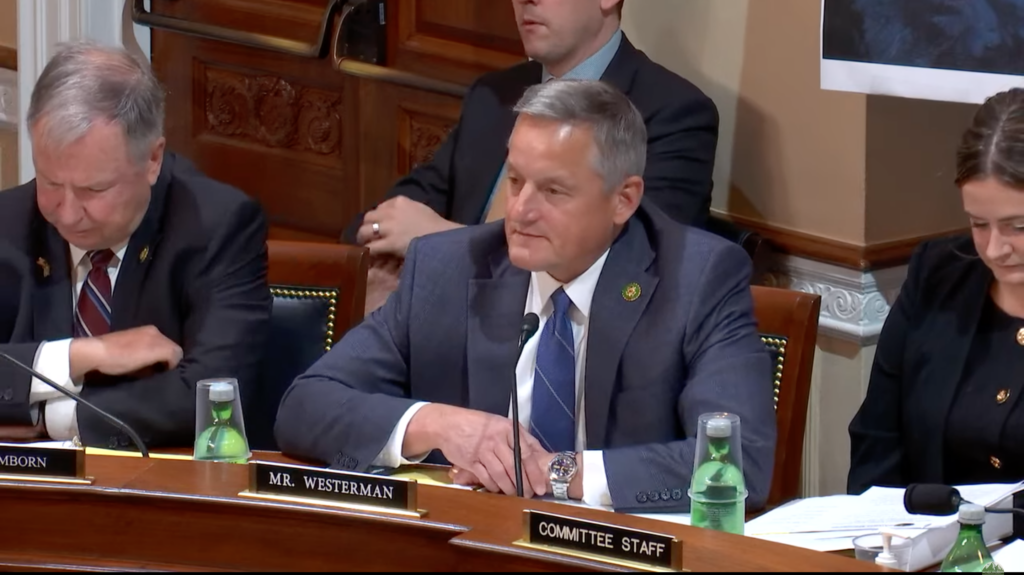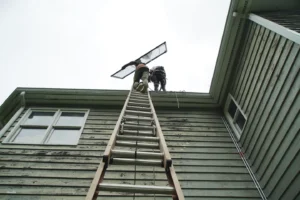House Approves Bill to Block Sheltering of Migrants in National Parks
Rep. Hageman said such programs ‘debase our national heritage,’ though prospects for passage unlikely
- Published In: Politics
- Last Updated: Dec 01, 2023

In remarks on the House floor Wednesday, Rep. Harriet Hageman (R-Wyo.) attacked the Biden administration's immigration policies as intended to convert national parks into "tent cities for illegal aliens." (Photo via C-SPAN)
By Jacob Gardenswartz
Special to the Wyoming Truth
WASHINGTON — The House of Representatives on Thursday narrowly passed a bill which would prohibit the use of federal lands for housing noncitizen migrants seeking asylum in the U.S., as Republicans continue to highlight U.S.-Mexico border security heading into the 2024 election season.
The bill, H.R. 5283, passed 224-203. Most Republicans and six Democrats voted in favor, while most Democrats opposed.
During debate on the House floor Wednesday, Rep. Harriet Hageman (R-Wyo.) decried President Joe Biden’s immigration policies, suggesting his administration is “now seeking to convert our national parks — America’s most cherished natural treasures and historical sites — into tent cities for illegal aliens,” actions which she alleged “debase our national heritage.”
“We need serious reforms to end the flood of illegal immigrants into our nation, not half measures that failed to correct the disaster of this administration’s own making and endanger what is the very best idea America ever had,” concluded Hageman, known in the GOP conference for her hard-line immigration views.
Though Wyoming is home to some of the most popular parks in the nation, no migrants have been housed in parks within the state to date — and there are no plans to do so anytime soon. The most high-profile example of migrants being housed on park lands is in New York, where the federal government recently granted New York City officials’ request to build temporary migrant housing facilities at Floyd Bennett Field in Brooklyn.
About 500 migrants — mostly families — currently live in the facility, where per the lease agreement they’re authorized to stay for up to 60 days. The temporary shelters can accommodate a maximum of 2,000 people, something City officials say is necessary given the significant influx of migrants into the region.

Responding to criticism of the housing plan from Republican lawmakers earlier this fall, New York City Mayor Eric Adams told reporters he saw this path as the “least intrusive as possible to everyday New Yorkers [and] at the same time be[ing] as humane as possible, because we have to show that level of humanitarian aspect of this city.”
“If [New Yorkers] don’t want it there, then they can’t get upset when it goes inside their neighborhood and block,” Adams added.
If signed into law, the bill passed by the House on Thursday would revoke the approval for the New York City shelter and bar similar arrangements on any lands under the jurisdictions of the National Park Service, Bureau of Land Management, U.S. Fish and Wildlife Service or Forest Service.
Back in Washington, most Democratic lawmakers blasted the bill as anti-immigrant and counterproductive to the broader migrant crisis. Rep. Raúl Grijalva (D-Ariz.), the top Democrat on the House Natural Resources Committee with jurisdiction over the bill, said the measure amounted to a “political stunt that will invite even more hateful anti-immigration rhetoric from the extreme MAGA wing of the Republican Party.”
In the Democrat-controlled Senate, its prospects for passage are slim. Biden has promised to veto the measure should it reach his desk, with a White House statement of administration policy (SAP) arguing it would “significantly restrict the ability of the Department of the Interior and the Department of Agriculture to make decisions regarding the appropriate uses of their lands and resources, even in emergency or other situations.”
Immigration debates continue in the upper chamber
Separately, a bipartisan group of senators is deliberating about the White House’s $14 billion supplemental funding request for border security. Lawmakers are now discussing pairing that funding with Biden’s requests for additional aid to Israel and Ukraine, suggesting such a move may be required to win over holdouts opposed to sending more money to aid in Ukraine’s war against Russia.
Among the priorities of the Republicans involved in the immigration talks are measures to make it harder for asylum seekers to gain refuge in the U.S by raising the current threshold for what’s deemed a “credible fear” in their home countries.
Yet many Democrats say such a change would be unacceptable without additional measures to provide a path to citizenship for undocumented immigrants already here, such as those participating in the Deferred Action for Childhood Arrivals (DACA) program, more commonly known as “Dreamers.”
“Any proposal considering permanent changes to our asylum and immigration system needs to include a clear path to legalization for long-standing undocumented immigrants,” the Democratic senators involved in negotiations said in a Wednesday statement.
Bipartisan parks measure also under discussion
While lawmakers in opposing parties bicker about immigration and its relation to national parks, a separate, bipartisan measure concerning parks was also in the spotlight Thursday.
The House Natural Resources Committee’s subcommittee on federal lands held a legislative hearing on the “EXPLORE” Act, a bipartisan proposal to improve recreation activities and increase accessibility on national parks and other public lands.
Bringing together a host of priorities from different constituencies, the 221-page bill is something of a grab-bag of parks-related proposals. If passed, it would introduce new recreation incentives for U.S. service members and veterans, improve broadband access for park visitors, expand long-distance biking trails and clarify policies around fixing rock-climbing anchors in parks.
The measure also would address opportunities to utilize federal lands for housing in rural communities and streamline the permitting process for outdoor recreation companies — both priorities of Wyoming Sens. John Barrasso and Cynthia Lummis.
During a press conference outside the Capitol on Wednesday, Natural Resources Chairman Rep. Bruce Westerman (D-Ark.) said the bill marked the “culmination of hard work across our committee and the product of more than 15 bills championed by members on both sides of our dais.”
“While we might disagree on many things, we’re united in the fact that expanding access to outdoor lands and improving the experience for outdoor recreation on federal lands and waters is something worth fighting for,” Westerman added.
After Thursday’s hearings, Westerman noted he expects the bill to be voted out of committee as early as next week and make it to the floor for a full vote of the House soon after.













